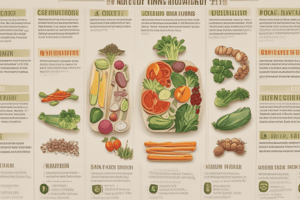Podcast
Questions and Answers
What are some dietary sources of essential nutrients?
What are some dietary sources of essential nutrients?
Milk products, eggs, fish, poultry, red meat, vegetables, fruits, nuts, legumes, whole grains, bread, pasta, cereal, green leafy vegetables, fruit juices, dried fruits, seafood products
What does a balanced diet include?
What does a balanced diet include?
All necessary nutrients, enough calories while avoiding excessive intake of some nutrients
Why does the typical American diet provide more protein than recommended?
Why does the typical American diet provide more protein than recommended?
Because it lacks fiber-rich plant foods
What are some ways to improve your diet?
What are some ways to improve your diet?
Why is nutrition important for maintaining good health?
Why is nutrition important for maintaining good health?
How can one achieve a healthy, balanced diet?
How can one achieve a healthy, balanced diet?
What is nutrition?
What is nutrition?
What are some common nutrients found in food?
What are some common nutrients found in food?
How does the digestive system contribute to nutrition?
How does the digestive system contribute to nutrition?
Why is protein important in nutrition?
Why is protein important in nutrition?
Why do different organs require unique nutrient mixes?
Why do different organs require unique nutrient mixes?
How do nutrients help the body fight infection?
How do nutrients help the body fight infection?
Flashcards are hidden until you start studying
Study Notes
Life Processes - Nutrition
Nutrition is one of the most important life processes that sustain our bodies. It involves consuming food to obtain essential nutrients required by living cells. Food contains energy from carbohydrates and fats, as well as proteins for building tissue. Our digestive system breaks down these complex molecules into simpler ones so they can pass through cell membranes and enter cells where they are processed further.
Nutrient Requirements
The human body needs certain types and amounts of nutrients, which can come from various foods. Some common nutrients are vitamins and minerals like Vitamin A, C, D, E, K; calcium, potassium, sodium, phosphorus, magnesium, zinc, iron, copper, manganese, cobalt, boron, silicon, selenium, nickel, molybdenum, chromium, fluorine, iodide, sulfur, vanadium, titanium, lithium, aluminum, tin, arsenic, barium, strontium, rubidium, cesium, and radium. These nutrients help our bodies grow, repair itself, make blood and fight infection. Every organ has its own unique mix of nutrients needed to function properly.
Dietary Sources of Essential Nutrients
Some dietary sources of essential nutrients include milk products such as cow's milk and yogurt, cheese; eggs and egg substitutes; fish such as salmon and trout; poultry items like chicken and turkey; red meat including beef and pork; vegetables like spinach, broccoli, lettuce, carrots; fruits such as strawberries, grapes, apples, bananas; nuts such as walnuts and almonds; legumes including beans and peas; whole grains like rice, oats, barley, wheat; bread made with white flour; pasta dishes; cereal bowls containing cornflakes, cheerios, raisin bran; green leafy vegetables including kale and collard greens; fresh fruit juices like orange juice; dried fruits including prunes, apricots, dates, figs; and seafood products including shellfish.
Balanced Diet
A balanced diet includes all necessary nutrients, providing enough calories while avoiding excessive intake of some nutrients. This balance varies according to age, sex, health status, lifestyle, occupation, and other factors. The typical American diet provides more protein than recommended because it lacks fiber-rich plant foods. For example, people eat too much fatty meat and dairy products but do not consume enough leafy vegetables and raw fruits. To improve your diet, you might want to limit your sugar consumption, reduce your salt intake, increase your vegetable consumption, drink fewer soft drinks and alcohol, and avoid eating between meals.
In conclusion, nutrition plays a crucial role in maintaining good health. Consuming sufficient amounts of proper nutrients ensures efficient bodily functions and prevents diseases. By selecting carefully among available foods and combining them intelligently, we can achieve a healthy, balanced diet.
Studying That Suits You
Use AI to generate personalized quizzes and flashcards to suit your learning preferences.




